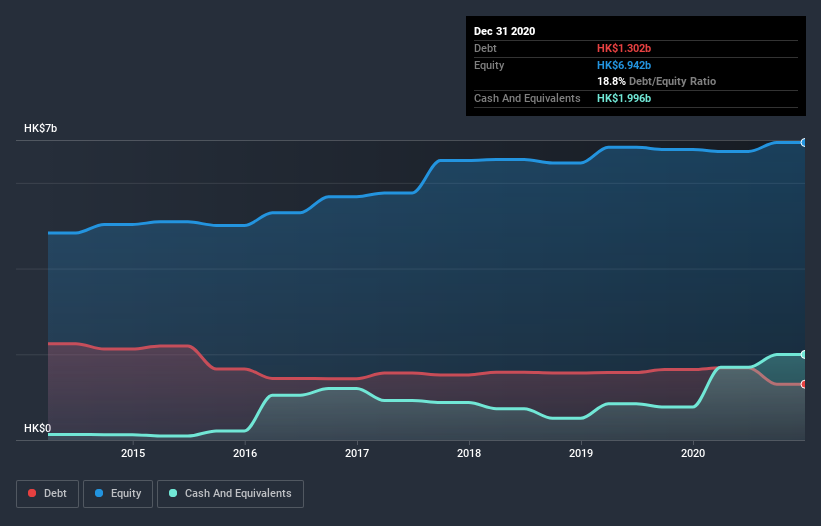
Some say volatility, rather than debt, is the best way to think about risk as an investor, but Warren Buffett famously said that 'Volatility is far from synonymous with risk.' So it seems the smart money knows that debt - which is usually involved in bankruptcies - is a very important factor, when you assess how risky a company is. Importantly, Cheuk Nang (Holdings) Limited (HKG:131) does carry debt. But is this debt a concern to shareholders?
When Is Debt A Problem?
Debt assists a business until the business has trouble paying it off, either with new capital or with free cash flow. Part and parcel of capitalism is the process of 'creative destruction' where failed businesses are mercilessly liquidated by their bankers. However, a more frequent (but still costly) occurrence is where a company must issue shares at bargain-basement prices, permanently diluting shareholders, just to shore up its balance sheet. Having said that, the most common situation is where a company manages its debt reasonably well - and to its own advantage. When we think about a company's use of debt, we first look at cash and debt together.
View our latest analysis for Cheuk Nang (Holdings)
What Is Cheuk Nang (Holdings)'s Net Debt?
The image below, which you can click on for greater detail, shows that Cheuk Nang (Holdings) had debt of HK$1.30b at the end of December 2020, a reduction from HK$1.64b over a year. However, its balance sheet shows it holds HK$2.00b in cash, so it actually has HK$694.8m net cash.

A Look At Cheuk Nang (Holdings)'s Liabilities
We can see from the most recent balance sheet that Cheuk Nang (Holdings) had liabilities of HK$3.30b falling due within a year, and liabilities of HK$1.05b due beyond that. Offsetting these obligations, it had cash of HK$2.00b as well as receivables valued at HK$281.7m due within 12 months. So its liabilities total HK$2.07b more than the combination of its cash and short-term receivables.
When you consider that this deficiency exceeds the company's HK$1.80b market capitalization, you might well be inclined to review the balance sheet intently. Hypothetically, extremely heavy dilution would be required if the company were forced to pay down its liabilities by raising capital at the current share price. Given that Cheuk Nang (Holdings) has more cash than debt, we're pretty confident it can handle its debt, despite the fact that it has a lot of liabilities in total.
Even more impressive was the fact that Cheuk Nang (Holdings) grew its EBIT by 263% over twelve months. If maintained that growth will make the debt even more manageable in the years ahead. The balance sheet is clearly the area to focus on when you are analysing debt. But you can't view debt in total isolation; since Cheuk Nang (Holdings) will need earnings to service that debt. So if you're keen to discover more about its earnings, it might be worth checking out this graph of its long term earnings trend.
Finally, a business needs free cash flow to pay off debt; accounting profits just don't cut it. Cheuk Nang (Holdings) may have net cash on the balance sheet, but it is still interesting to look at how well the business converts its earnings before interest and tax (EBIT) to free cash flow, because that will influence both its need for, and its capacity to manage debt. Over the most recent two years, Cheuk Nang (Holdings) recorded free cash flow worth 69% of its EBIT, which is around normal, given free cash flow excludes interest and tax. This free cash flow puts the company in a good position to pay down debt, when appropriate.
Summing up
Although Cheuk Nang (Holdings)'s balance sheet isn't particularly strong, due to the total liabilities, it is clearly positive to see that it has net cash of HK$694.8m. And it impressed us with its EBIT growth of 263% over the last year. So we are not troubled with Cheuk Nang (Holdings)'s debt use. When analysing debt levels, the balance sheet is the obvious place to start. But ultimately, every company can contain risks that exist outside of the balance sheet. To that end, you should learn about the 3 warning signs we've spotted with Cheuk Nang (Holdings) (including 1 which shouldn't be ignored) .
When all is said and done, sometimes its easier to focus on companies that don't even need debt. Readers can access a list of growth stocks with zero net debt 100% free, right now.
If you decide to trade Cheuk Nang (Holdings), use the lowest-cost* platform that is rated #1 Overall by Barron’s, Interactive Brokers. Trade stocks, options, futures, forex, bonds and funds on 135 markets, all from a single integrated account. Promoted
New: AI Stock Screener & Alerts
Our new AI Stock Screener scans the market every day to uncover opportunities.
• Dividend Powerhouses (3%+ Yield)
• Undervalued Small Caps with Insider Buying
• High growth Tech and AI Companies
Or build your own from over 50 metrics.
This article by Simply Wall St is general in nature. It does not constitute a recommendation to buy or sell any stock, and does not take account of your objectives, or your financial situation. We aim to bring you long-term focused analysis driven by fundamental data. Note that our analysis may not factor in the latest price-sensitive company announcements or qualitative material. Simply Wall St has no position in any stocks mentioned.
*Interactive Brokers Rated Lowest Cost Broker by StockBrokers.com Annual Online Review 2020
Have feedback on this article? Concerned about the content? Get in touch with us directly. Alternatively, email editorial-team (at) simplywallst.com.
About SEHK:131
Cheuk Nang (Holdings)
An investment holding company, engages in the investment, development, management, and trading of properties in the People’s Republic of China, Macau, Hong Kong, and Malaysia.
Adequate balance sheet very low.
Market Insights
Community Narratives



